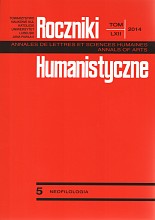Holocaustgedenken als innerer Imperativ: Zu Gedächtnisorten – Auschwitz und Warschauer Ghetto-Ehrendenkmal – im Nachkriegswerk (1949) Stephan Hermlins
Memory of the Holocaust as an Imperative: Places of Remembrance — Auschwitz and the Monument of the Heroes of the Warsaw Ghetto Uprising ...
Author(s): Małgorzata DubrowskaSubject(s): Literary Texts
Published by: Towarzystwo Naukowe KUL & Katolicki Uniwersytet Lubelski Jana Pawła II
Keywords: Stephan Hermlin; GDR-Literature; Holocaust
Summary/Abstract: In the literature of the GDR, where the problem of the II World War was a central topic, texts that were related to the annihilation of the European Jews were almost nonexistent. The reasons of this void were political matters: The political leaders of the GDR created so called “anti-fascist creator myth” of a new country and claimed themselves as “the heroes of the history”; additionally they declared aggressive anti-Israeli politics. The works of Stephan Hermlin, written in 1949, in the same year as the creation of the GDR, are a few of the examples that faced the Holocaust in the literature generated in the East Germany. The main starting points in the author’s writings were the places of the remembrance that he visited in 1949: Auschwitz and the Monument of the Heroes of the Warsaw Ghetto Uprising; in his writings the memory of the murdered victims becomes a value of a superior significance.
Journal: Roczniki Humanistyczne
- Issue Year: 62/2014
- Issue No: 05
- Page Range: 177-190
- Page Count: 14
- Language: German

